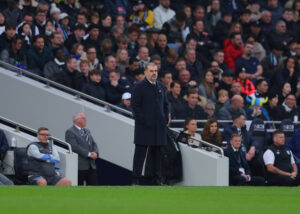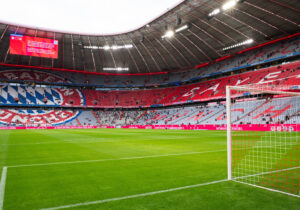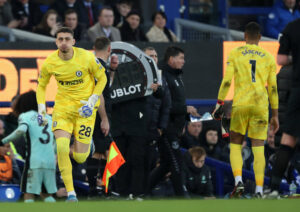While Lyndon Dykes may have celebrated his 26th birthday on Thursday, October 7, there is a lot more for him to cheer about beyond that.
He consolidated his place as Queens Park Rangers’ main striker and started the season in great form. Dykes is also a regular member of the Scottish national squad, with the striker starting the three matches Scotland were involved in at Euro 2020.
The number nine has made a jump that has proved a fair number of doubters wrong. Particularly his club performances, it is far cry from where he was last winter.
The Transformation of Lyndon Dykes
Transfer to QPR from Livingstone
QPR announced the signing of Lyndon Dykes from the Scottish Premiership side Livingstone last summer. The majority of Rangers fans knew little of him other than his direct style of play and physicality. This was mainly because it is what he talked about when he joined the club.
“The physical side of the Championship is not a worry for me,” he said in an interview with Sky Sports. “I like that side of the game sometimes – I’m willing to get in there and rough some people up.”
The 6’2″ striker was bought for a rumoured £2 million fee, signing a four-year contract, and Rangers handed him the number nine shirt. Many could conclude that QPR were committed to their new striker in the long term.
Things looked promising when Dykes scored two penalties in two games. During the September and October international breaks, he opened his tally for his country with two goals from four games.
This gave plenty of hope he could be a major difference for QPR. The year saw guaranteed goals leave the Kiyan Prince Foundation stadium. Eberechi Eze departed for Crystal Palace and Jordan Hugill’s loan expired. In January 2020, Nahki Wells was recalled by Burnley and sold to Bristol City. QPR decided not to spend beyond their means.
Consequently, this left a lot of weight on Dykes to deliver consistently. Rangers’ striker netted three more goals in eight games, but worries began to set in. Only one goal game did not come from the penalty spot during his first four months in West London.
Thereafter, the goals dried up completely.
The Goals Dry Up
QPR’s last win of 2020 came on 24th November in a 3-2 home win against Rotherham United. Dykes’ final goal of the year came three days later in an away loss to Brentford. The following eight games saw Rangers pick up just three points and scoring four in the process.
Mark Warburton’s side was lingering above the relegation zone. Their defence was poor and their attack was toothless. Dykes was left isolated, killed of confidence. Many wanted the manager gone. Instead, the board wanted reinforcements.
The winter transfer window changed QPR. They let dynamic winger Bright Osayi-Samuel leave, loaned in Charlie Austin, Stefan Johanson, Sam Field and Jordy De Wijs, and switched to a 5-3-2 to match the recruitment.
The four signings were the missing pieces to Warburton’s team. They pulled themselves up and pursued a midtable finish. Between January and March, they won seven games from a possible 13.
Unfortunately, the wins never blossomed into goals for Dykes. Joe Supple of OptaJoe reported that in his first 33 games, 29 of which were starts, he scored five goals with a shot conversion rate of 11.4%.
Despite this, Warburton kept his faith in the Scottish international throughout the process. Dykes finally got his repentance in an away draw to Reading on the final day in March. He tapped the ball away. In the process, a lost smile appeared on his face with Austin being the most ecstatic of the players congratulating him.
It was his first goal since November and the second open-play goal of his QPR career.
A Reformed Lyndon Dykes
A goalless international duty in March heeded little as the first signs of a reformed player arrived. Dykes netted four goals in three games and none were penalties. Suddenly, the striker looked more comfortable than he ever had done at Rangers.
One reason for his quick return to form was the influence of Austin. The striker’s experience is one of the key assets to QPR and has made a mark on his partner. Two days after Dykes scoring a brace against Sheffield Wednesday, Austin told the press he has to change his mentality.
He said: “He needs to be more selfish. It’s a centre-forward mentality. It’s great being a team player with a work ethic – and I get that stuff. But ultimately strikers are judged on their tally of goals.
“If he had 15 goals and was bang average everyone would be buzzing because he had 15 goals. That’s the catch-22 of being a centre-forward.”
The forward was also supportive of his partner, telling the media “it’ll happen for him” and “it was inevitable that he was going to start scoring”.
The Scottish international scored two more goals in the remaining games as his attention was rightfully turned to the Euros. His performance at the Euros showed glimmers of what he can do as a physical striker, despite not scoring.
His performance against England was excellent. He held the ball well, worked effectively with Che Adams and got his team into the game. Dykes’ best chance came when he smashed a volley against the post.
He was inches away from becoming a Scottish hero.
A New Season
Lyndon Dykes continued his great late form into the new season and has put up complimentary stats in the process. So far, the striker has four goals for club and two goals for country.
Supple also found that in his last 20 appearances domestically, he has scored 11 goals with a conversion rate of 32.4%. In addition, he has provided six assists. In maths’ great rule of averages, Dykes has gone from being involved in a goal every 410 minutes, to being involved every 83 minutes. The transformation is staggering.
Lyndon Dykes has been directly involved in 17 goals in his last 20 games for QPR in all competitions, 11 more than he had contributed in his first 33 games for the club.
🔵#QPR⚪️ pic.twitter.com/OHFGr0pWKX
— Jack Supple (@JTSupple) October 6, 2021
Beyond the figures, Dykes is more expressive in his play. His hold up and inter-play between teammates is executed more effectively. Ilias’ Chair’s second goal against Birmingham would not have happened if Dykes did not control the ball in the air, muscle the defender, turn and poke through his teammate.
When he came on as a sub against Coventry, his first involvement in the game were simple: one-touch control on the edge of the box, one-touch outside-of-the-boot finish in the bottom right corner. The euphoria never went away with Dykes producing a formidable performance in the air.
Other than toe-poking the first goal against Preston, Dykes again showed his commitment when he somehow headed the ball whilst on the floor, recovered and assisted Chair for the winner.
Everything the striker is involved in right now turns to gold. That is why his transformation from last winter deserves recognition.
Little can be said about how long Dykes can maintain his form or how far it can take him, but QPR and Scotland will not be thinking about that. They will just be glad that their investment and faith is paying off.
Main Photo






